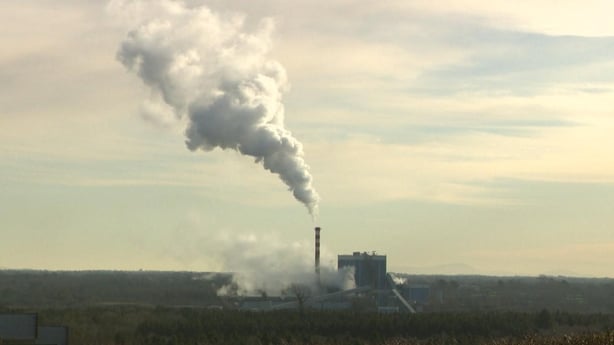An Taisce has criticised Bord na Móna for its ongoing importation of woodchip material for burning in power generation.
Last week, a large cargo ship docked in Foynes, Co Limerick with a cargo of woodchip.
Shipping data shows the ship left the port of Santana, Brazil on 24 November on its 7,000km journey to Ireland.
The ship is a specially designed vessel capable of carrying over 40,000 tonnes.
The shipment of the woodchip was destined for Bord na Móna's power-generating station in Edenderry, Co Offaly.
Bord na Móna said that the power station plays an important role in providing firm capacity from a renewable and sustainable fuel mix.
It said a combination of biomass materials is needed to produce the correct fuel mix for power generation.
In a statement, Bord na Móna added: "To achieve the required biomass mix, Bord na Móna sources the vast majority of sustainable residual material from indigenous suppliers in Ireland.
"When the remaining biomass required cannot be acquired locally due to volume and suitability constraints, it is supplemented with material sourced internationally as a result."
Bord na Móna said it works with an international non-profit organisation that supports better land management and business practices at international sites where biomass material is sourced.
It said that the organisation carries out sustainability audits at these locations on its behalf.
Head of Advocacy with An Taisce Ian Lumley said that the importation and burning woodchip from south America to generate energy here is "illogical".
"Bord na Móna has had difficulty from the start in sourcing sufficient biomass material for its operations.
"So for years now we have been seeing this filling of the gap with materials mainly from South America - a continent that itself is facing huge environmental challenges and should not be exporting biomass to Europe for burning - no more than we should be tolerating under the Mercosur agreement the importation of agricultural produce that is continuing the destructing of the Amazonian rainforest.
"We should not be bringing biomass from South America so we ourselves can feel virtuous in terms of reducing our carbon emissions. Our focus should be on energy efficiency and renewable energy and if there is a place for biomass material it should be sourced domestically as opposed to anywhere else."
Mr Lumley also said that the carbon footprint of this shipment is attributed to South American countries where the material is harvested.
He described this as a 'loophole' in the carbon calculation process.
Mr Lumley added: "In this case while it complies with the rules, it doesn’t make it green. The idea of importing biomaterial from South America to burn it in Ireland and claim that we are virtuous because it is classified as carbon neutral simply because a quirk of the current carbon counting rules allows us to do that.

"That’s not real green energy. Real green energy needs to be indigenous and sustainable and not depending on dragging material across the Atlantic by ship. So the whole thing is the most ungreen and unstainable form of energy and 'greenwash’ is the only way to describe it".
He said that Bord na Móna should stop importing this type of material.
The global environmental network Greenpeace also questioned the reliability of the sustainability audits being carried out at international biomass-producing locations.
Greenpeace Forest campaigner Grant Rososman said: "Our experience with sustainability audits for commodities such as wood is that they are weak and inconsistent. We did an assessment of a number of certification schemes and found all of them to be unreliable."
Mr Rosoman said that there is ongoing concern regarding the possibility of uncertified material being mixed with other materials adding to deforestation.
Bord na Móna said the organisation it uses completes sustainability audits at international locations, which adhere to SBP (Sustainable Biomass Programme), FSC (Forest Stewardship Council) and EUTR (European Union Timber Regulation) regulations.
It added that Bord na Móna is issued with a product Phytosanitary certificate to ensure compliance with Department of Agriculture import requirements.
Bord na Móna did not respond to queries regarding the total number of shipments it has sourced from South America or whether it plans further shipments.







